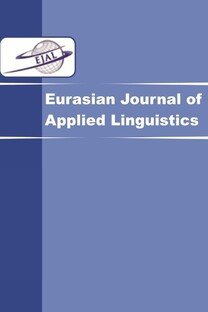Constraints in Spoken Proficiency: Causes and Remedial Measures
Spoken proficiency in English has become indispensable in engineering industry. It is expected of an
engineering student to possess requisite spoken proficiency for his/her career growth prospects. The
paper focuses on the impediments in the speaking skills of the engineering students and also finds the
ways to improve students’ speaking skills using task-based pedagogical design. The article further
investigates the factors that affect the speaking performance of the ESL learners. This article explores
the pivotal role played by the pedagogical intervention in the classroom in enabling the learners to
overcome the constraints in speaking. The participants of the study chosen for control and experimental
group were first year civil engineering students comprising 38 in each group respectively. T-test was
used to compare the performance of the students in control and experiment groups. The cross tabulation
was also computed to know the scoring pattern of the spoken components in the assigned tasks. The
results revealed that there was a significant level of improvement in the oral proficiency of the
experimental group.
Keywords:
Affective factors, engineering students, oral communicative tasks speaking constraints, spoken proficiency,
___
- Aydin, S. (2008). An investigation on the language anxiety and fear of negative evaluation among Turkish EFL learners. Online Submission. Benson, P. (2001). Teaching and Researching Autonomy in Language Learning. London: Longman.
- Brown, H.D. (2001). Teaching by Principles. An Interactive Approach to Language Pedagogy. Englewood Cliffs: Prentice Hall.
- Bygate, M. (1987). Speaking. Oxford: Oxford University Press.
- Council of Europe (2001). Common European Frame work of References for languages: Learning, Teaching, Assessment. Cambridge: Cambridge University Press.
- Dörnyei, Z. (2001). Motivational Strategies in the Language Classroom. Cambridge: Cambridge University Press. DOI: http://dx.doi.org/10.1017/CBO9780511667343
- Edge, J. (1989). Mistakes and Correction. Longman Keys to Language Teaching. Harlow: Longman.
- Ellis, R. (2002). The evaluation of Communicative Tasks. In B. Tomlinson (Ed.), Materials Development in Language Teaching. Cambridge: Cambridge University Press. 217-238.
- Ellis, R. (2003) Task-based Language Learning and Teaching. Oxford: Oxford University Press.
- Harmer, J. (2007). How to Teach English-New edition. Harlow: Pearson Education Limited.
- Horwitz, E. K., Horwitz, M. B., & Cope, J. (1986). Foreign language classroom anxiety. The Modern Language Journal, 70(2), 125-132.
- Jamila , M. (2013). Use of Learner Autonomy in Teaching Speaking by Tertiary Level English Language Teachers in Private Universities of Bangladesh. IOSR Journal Of Humanities and Social Science, 18(4), 29-43.
- Jianing, X. (2007). Storytelling in the EFL Speaking Classroom. The Internet TESL Journal, 13(11), Retrieved on April 10, 2010 from www.iteslj.org.
- Juhana. (2012). Linguistic Factors that Become Students’ Obstacles to Speak in English Class. Journal of Education and Practice, 3(12), Retrieved on 25.10.2016 from www.iiste.org.
- Kothari, C.R. (2004). Research Methodology: Methods and Techniques. New Age International: New Delhi.
- Liu, M. & Jackson, J. (2009). Reticence in Chinese EFL students at varied proficiency levels. TESL Canada Journal, 26(2), 65-81.
- Long, M. H. & Crookes, G. (1992). Three approaches to Task-based syllabus design. TESOL Quarterly, 26(1), 27- 55.
- MacIntyer, P.D. & Gardner, R.C.(1991). Language anxiety. Its relationship to other anxieties and to processing in native and second languages. Language Learning, 41, 513-534.
- Mohammadipour, M. & Rashid, S. (2015). The impact of task-based instruction program on fostering ESL learners’ speaking ability: A cognitive approach. Advances in Language and Literary Studies, 6(2).
- Nunan, D. (1988). Syllabus Design. Oxford: Oxford University Press.
- Nunan, D.(1991a). Language Teaching Methodology. London: Prentice Hall International.
- Nunan, D. (1991b). Communicative tasks and the language curriculum. TESOL Quarterly, 15(2), 279- 295. Retrieved from http://jlls.org/index.php/jlls/article/viewFile/178/165 Retrieved from http://timesofindia.indiatimes.com/city/mumbai/Only-18- engineering-grads-are-employable-says-survey/articleshow/38438996.cms
- Peloghitis, J. (2006). Enhancing communication through the use of foreigner interviews. Journal of NELTA, 11(1-2), 47-51.
- Prabhu, N .S. (1987). Second Language Pedagogy. Oxford: Oxford University Press.
- Reimer, M.J. (2007). Communication Skills for the 21st Century Engineer. Global Journal of Engineering Education, 11(1), 89-100.
- Shanmugasundaram, S.(2013) . Factors Affecting the Spoken English of Tertiary Level Students from Arts and Science Colleges in the District of Tiruchirapalli and Thanjavur- A Study, PhD Thesis, Department of Humanities, NITT.
- Nunan, D. (1999). Second Language Teaching & Learning. Heinle & Heinle Publishers.
- Öztürk, G., & Gürbüz, N. (2014). Speaking anxiety among Turkish EFL learners: The case at a state university. Journal of Language and Linguistic Studies, 10(1), 1-17.
- Only 18% engineering grads are employable, says survey. (2014, July 16). The Times of India.
- Thornbury, S. (2005). How to Teach speaking. Harlow, England: Longman. http://www.sciencedirect.com/science/article/pii/S1877042814005047 Retrieved from Tokoz-Goktepe, F. (2014). Speaking problems of 9th grade high school Turkish learners of L2 English and possible reasons for those problems: Exploring the teachers and students’ perspectives. Procedia-Social and Behavioral Sciences, 116, 1875-1879.
- Ur, P. (1995). A Course in Language Teaching. Practice and Theory. Cambridge: Cambridge University Press.
- Van Le, T. (2014). Factors Affecting Task-Based Language Teaching from Teachers’ Perspectives. Study in English Language Teaching, 2(1) 108-122.
- Willis, J. (1996). A Framework for Task-Based Learning. Harlow, Essex: Addison Wesley Longman. Longman.
- Zaremba, A. J. (2006). Speaking Professionally. Canada: Thompson South-Western.
- ISSN: 2149-1135
- Başlangıç: 2015
- Yayıncı: Ece Zehir Topkaya
Sayıdaki Diğer Makaleler
An action research on the development of self- regulated writing strategies of Turkish EFL students
Research into pronunciation learning strategies of pre-service English teachers
Synectics as a prewriting technique: Its effects on writing fluency and lexical complexity
